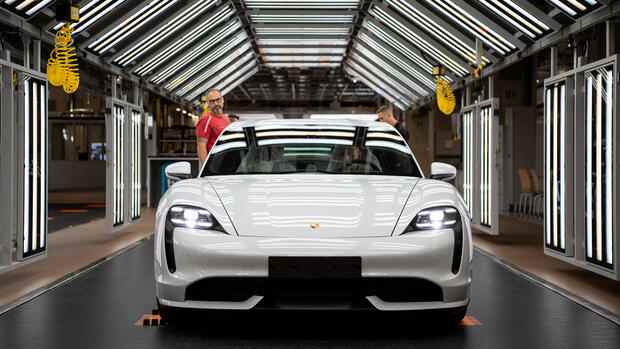The top-of-the-range electric model has suffered from delivery problems for the chip components.
(Photo: dpa)
Stuttgart Porsche’s era of sales records is over for the time being. The Stuttgart-based premium manufacturer has recorded declining sales figures so far this year. In the first six months of 2022, the number of deliveries worldwide fell by five percent to 145,860 vehicles.
“The first half of the year was characterized by external influences and imponderables,” says Porsche’s Sales Director Detlev von Platen. In addition to the restrictions caused by the renewed outbreak of the corona pandemic in China and other markets, persistent supply chain bottlenecks and logistical challenges are responsible for this.
The weak sales are a damper for the stock exchange plans of the luxury manufacturer, which is otherwise spoiled by sales records. Next Monday, the management wants to advertise the planned IPO on a capital market day among investors.
Last year, Porsche sold more than 300,000 vehicles for the first time. The Swabians were even able to escape the chip crisis to a large extent, since the sports car manufacturer was given preference to being supplied with semiconductors within the VW Group due to the high margins for its luxury vehicles.
Top jobs of the day
Find the best jobs now and
be notified by email.
But now the general trend is catching up with Porsche. If the development continues, Porsche is likely to slip back below the 300,000 vehicle mark. In the second half of the year, von Platen intends to do everything in his power to resist the downward trend: “As in previous years, we are looking to the future with optimism and are determined to make full use of the remaining months of the year.”
China, by far the largest single market, is currently causing the greatest problems. Here, Porsche delivered 40,681 units, 16 percent fewer vehicles than in the same period of the previous year. The head of sales sees this as a success, at least compared to the competition, because of the lockdowns in numerous cities with over a million inhabitants.
Sales slump in China, less Taycan
In China, the entire luxury and premium segment collapsed by almost a quarter. On June 1st, Porsche China boss Jens Puttfarcken was replaced by the previous Japan boss Michael Kirsch. However, according to data from the industry association PCA, there were initial signs of recovery in the entire Chinese car market in June. Porsche’s sales manager is also hoping for a sustained trend reversal.
In the second largest market, the USA, deliveries fell by a tenth. There, Porsche faced delivery and transit problems. In contrast, the Zuffenhausen-based company was able to increase deliveries in Europe by seven percent to 43,087. This also applies to the home market of Germany: 13,785 deliveries in the first half of the year mean an increase of five percent.
>> Read also: Volkswagen paves the way for Porsche’s IPO
All-terrain vehicles are still the most popular worldwide. 41,947 customers bought the Cayenne. The smaller Macan off-road model followed in second place with 38,039 deliveries. The sports car icon 911 was handed over to 21,616 customers worldwide.
The electric Porsche Taycan, which is supposed to stand for the environmental friendliness of the group, had 18,877 deliveries. That’s almost 1,000 fewer electric cars, which cost more than 100,000 euros depending on the equipment, than in the same period last year.
Porsche justifies this with the limited production due to supply bottlenecks for semiconductors. Fully electric vehicles generally have a significantly higher proportion of chips. Of all the company’s models, the Taycan was the hardest hit by production stops. In addition, due to a lack of cables, no vehicles could be completed for almost two weeks.
More: VW needs more central leadership – anything else would be a waste of money
